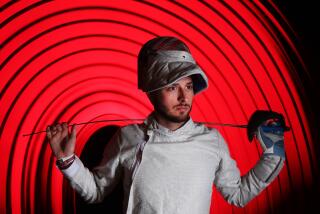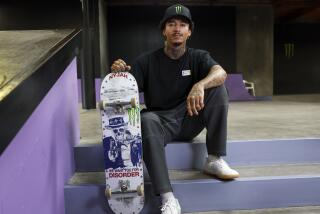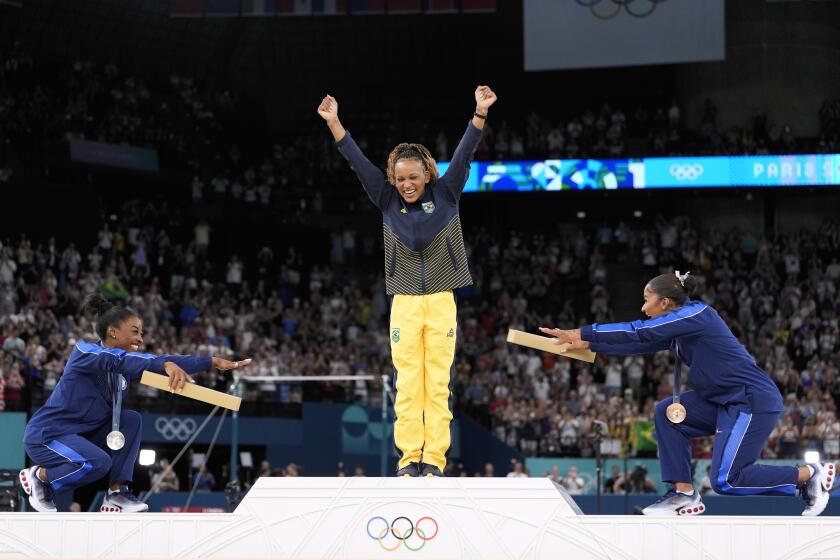He’s Pedaling Past Illness Toward Future : Cycling: Mark Hanlon of El Toro discovered he has Epstein-Barr, but it didn’t keep him from the Olympic Festival.
CARSON — Mark Hanlon knows he’s not supposed to be here. He shouldn’t be hunched over his racing bike, flying around the Olympic Velodrome in the team pursuit race at the U.S. Olympic Festival.
Hanlon, an 18-year-old from El Toro, was supposed to compete at the U.S. nationals last week in Seattle.
But his health--and his future in cycling--suffered a major setback last March when he learned he had Epstein-Barr, a virus that affects the body’s immune system. It’s the same virus that cyclist Greg LeMond suffered a few years ago.
“It’s similar to mononucleosis,” said Hanlon, who is aiming for a spot on the 1992 Olympic team. “It can kick in at any time. I really have to watch my act now, what I do and how strenuous it is.
“I was out for 2 1/2 months, and it set back my training almost a year.”
So Hanlon, who withdrew his entry to the nationals last month, has come to the Festival on the road to recovery. He was a member of North team that finished fourth in the men’s four-kilometer team pursuit late Saturday night.
“I had hopes of doing well at nationals,” he said. “But now I realize I have a long road in front of me.
“I know I’m not riding to my expectations right now, and that has motivated me. I want to show all the coaches that this is not a joke to me. I’m serious and I’m not just out here screwing around.”
Before he became sick, Hanlon had been one of the nation’s most promising young riders.
He won the individual pursuit four-kilometer race last year at the world trials, and was first in the team pursuit at the junior world trials. He also finished second in the individual and team pursuit one-kilometer races at last year’s junior nationals.
Hanlon’s performance at the junior world trials caught the eyes of the Olympic coaches, who asked him to come to the Olympic Training Center in Colorado Springs, Colo., last fall.
His training plans conflicted with his education. He was entering his senior year at El Toro High when he was invited to Colorado Springs.
He asked El Toro officials if he could complete his schoolwork while in Colorado. He was surprised by their answer.
“El Toro wanted no part of my cycling,” he said. “They (school officials) put it on the same level as baton twirling.”
Instead, he took independent study classes through Mira Monte (Colo.) High while training in Colorado. He completed his education last November, eight months ahead of schedule.
“It was nice,” he said, “because it let me travel and train without worrying too much about school.”
His carefree days ended in mid-March, when he became ill while competing at an international race in Uruguay, South America.
“I caught a cold down there and I couldn’t get rid of it,” he said. “I wasn’t sure what was wrong with me. I was tired all the time.”
Hanlon left South America and returned home to El Toro. Doctors ran a series of blood tests, and discovered the virus.
Hanlon thought his cycling career was over.
For the next month, he barely got out of bed. The virus sapped him of his strength.
“I had no motivation at all,” he said.
After 2 1/2 months of rest, Hanlon got approval from his doctors to begin training. His workouts were light, usually on an exercise bike or short distances.
Hanlon’s normal training schedule is grueling. In Colorado, he would ride two to five hours a day and lift weights five to six hours a week.
Although he races on a track, much of Hanlon’s training is done on the road--as many as 500 miles a week.
“Most people think we just ride on the track,” he said. “But the road work is good. You need the power base and speed for riding on a track, and you get that when you work out on the road. It really gets you ready to race.”
Even though he spent only a few months at the training center, Hanlon said the experience has been valuable.
“It has made me learn a lot about myself and how hard I can push my body,” he said. “It’s an opportunity I’m glad I took.”
Hanlon has come a long way since he first started riding with a neighbor six years ago.
“I got interested in cycling after the 1984 Olympics,” Hanlon said. “The road race was in Mission Viejo, and I went and watched all the time. Then I just started riding around town.”
Hanlon, 6 feet 1 and 165 pounds, began entering local races and doing well. His younger brother, Matt, 17, started riding with him.
“I was really focused and wanted to do well,” Hanlon said. “I would run home after school, change my clothes and go ride.”
With financial and moral support from his parents, Mike, an engineer, and Val, a secretary, Hanlon began traveling to more prestigious races a few years ago. And he kept winning.
“Without my parents, I wouldn’t be at the level I am,” Hanlon said. “It’s nice to have that kind of help, because not all the riders do. It’s not like they’re going to desert me if I don’t do well.”
With help from his parents and sponsorship from Oakley sunglasses, Hanlon pays for his equipment and travel costs. His bike costs about $1,000, and his clothing and other equipment about $200.
“And travel’s real expensive,” he said. “When you get on a good racing team, they’ll pay for all your expenses. I hope to catch on with a good team by next year.”
The next 12 months will be important for Hanlon. All his efforts will be geared toward the national championships, which serve as qualifying for the Olympic team.
“Right now, I’m still shooting for the Olympic team,” he said. “I have a lot to prove to the coaches after my illness and missing this year’s nationals.”
More to Read
Go beyond the scoreboard
Get the latest on L.A.'s teams in the daily Sports Report newsletter.
You may occasionally receive promotional content from the Los Angeles Times.







